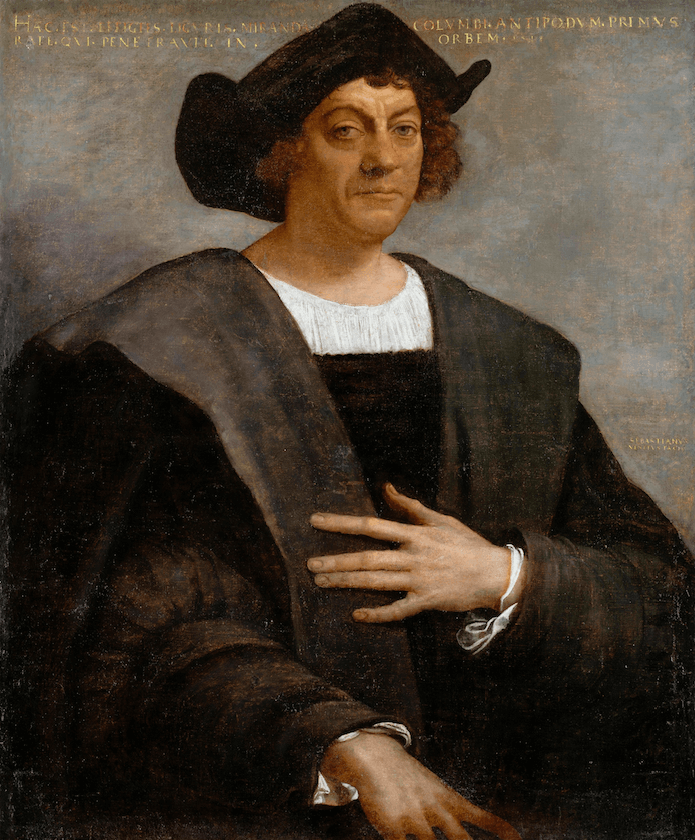by The Cowl Editor on October 19, 2017
Opinion

by Lela Biggus ’18
Opinion Staff
The passing of Columbus Day this year brings me back to one of the most embarrassing cultural blunders of my study abroad experience. Living with a homestay family in Buenos Aires, Argentina this past spring, misunderstandings were bound to be a part of my reality, but one instance was particularly cringe-worthy.
I was at dinner with my homestay parents and their children, and the topic of conversation was the infamous “Conquista del desierto,” or “Conquest of the Desert,” led by Julio Argentino Roca during the 1870s and the accompanying decimation of indigenous Mapuche communities in the Patagonian region.
My homestay mother’s son-in-law asked me who discovered what is today the continental United States. I responded as many of us might, saying that Christopher Columbus is credited with “discovering America.” He responded by saying no, Columbus discovered Hispaniola and the Bahama Archipelago, but he wanted to know who was the first to land in what is today the United States.
I did not respond because I realized I did not know the answer. There I was studying Argentine history, and I did not even know the basics of my own.
A sense of embarrassment came over me, but beyond that was a deeper sense of disappointment. The moment of truth had arrived.
I have never been a student of history. I was always in the lowest level history classes in high school and never spent much mental energy on the subject.
So there I was, with all my years of floating through history classes disputed on the dinner table before me. This egregious gap in my formal schooling had finally caught up with me.
The general public does not have access to a single “truth” about Columbus even today. Theories about who had the first foreign encounter with what is today the U.S. include John Cabot, Leif Erikson and the Vikings, African groups that made their way into North America even before that, and countless other ideas, tip-toeing the line between mythical and real.
Almost everything about our elementary school education on Christopher Columbus was a lie, yet it seems that many of my peers today do not know as much.
For example, the real names of his ships were not the Nina, Pinta, and Santa Maria; those were only nicknames. He did encounter “America,” only if we use the term correctly and not colloquially and apply it to the North American continent, which includes the islands of the Bahamas.
What is most frustrating is not the details, it is that we still honor Columbus; though we do so more as a compilation of all that we treasure in American culture than as the historical figure himself. The truth is, it really does not make much of a difference if we decide to glorify Columbus rather than some other European explorer.
Columbus represents individuality, freedom, proprietorship, and endless opportunity; he is the American Dream dead and gone. He represents all that Americans want and so we have taught our children for generations that he is our collective national hero. He did in fact change the world and his Italian heritage is a source of pride for many today.
However, for many of us, what was celebrated on Oct. 9 was the culture of conquest and domination that we equate with civilization. What we have internalized is the necessity to swallow up all that we encounter, taking what is not meant to be owned, and prioritize material wealth over taking responsibility for one another.
The common teaching is that white men colonized and “civilized” because they had, as Jared Diamond’s book title suggests, “guns, germs, and steel,” and that Native Americans would have done the same if they had the capacity to. Our American cultural understanding of dominance and conflict is that it is historically proven to be natural, necessary, and unavoidable. Dominance, however, is not a foundation of human behavior.
I did not want to be viewed as a consumer of Argentine culture, gathering skills and knowledge to bring back to the United States and market myself with, but perhaps unavoidably that is exactly what I was doing.
Despite this, cultural encounters like those that I experienced in Argentina are opportunities to rewrite a culture reliant upon the commodification of man and nature.
In making ourselves forces for collaboration, understanding, and empathy during cross-cultural interactions, perhaps we can begin to adopt a new culture surrounding partnership and respect.
Comments are closed.
Apparently, “native americans” were not the first “indigenous” people here in North America. Evidence is mounting that they pushed out a previous population of European-centric origin:
The Smithsonian Magazine:
http://www.smithsonianmag.com/smart-news/the-very-first-americans-may-have-had-european-roots-5517714/?no-ist
The Very First Americans May Have Had European Roots
Some early Americans came not from Asia, it seems, but by way of Europe
The Washington Post:
http://www.washingtonpost.com/national/health-science/radical-theory-of-first-americans-places-stone-age-europeans-in-delmarva-20000-years-ago/2012/02/28/gIQA4mriiR_story.html
Radical theory of first Americans places Stone Age Europeans in Delmarva 20,000 years ago
The National Geographic:
http://news.nationalgeographic.com/news/2003/09/0903_030903_bajaskull.html
Controversy erupted after skeletal remains were found in Kennewick, Washington, in 1996. This skeleton, estimated to be 9,000 years old, had a long cranium and narrow face—features typical of people from Europe, the Near East or India—rather than the wide cheekbones and rounder skull of an American Indian.
http://sciencenordic.com/dna-links-native-americans-europeans
Ancient DNA reveals that the ancestors of modern-day Native Americans had European roots. The discovery sheds new light on European prehistory and also solves old mysteries concerning the colonisation of America.
https://www.google.com/search?q=europeans+were+the+first+americans&ie=utf-8&oe=utf-8&aq=t&rls=org.mozilla:en-US:official&client=firefox-a&channel=sb